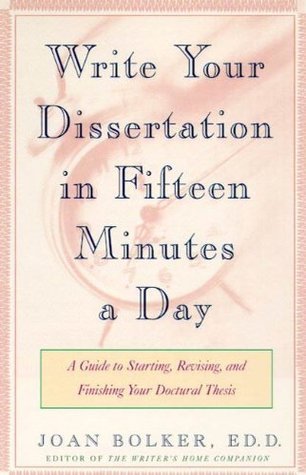What do you think?
Rate this book


While some of the book's advice is of interest only to dissertation writers, much of the information--on battling writer's block, for instance--is valuable to anybody engaged in writing. Rather than being filled with rules defining how to become a great writer, Writing Your Dissertation in Fifteen Minutes a Day is about finding the process by which you can be the most productive--it's a set of exercises that you can use to find out more about you and the way you write. Along the way, you'll do a bit of writing. And that's what matters, especially when you experience writer's block--as Bolker says, "Write anything, because writing is writing." With its helpful advice and supportive tone, Writing Your Dissertation in Fifteen Minutes a Day should be required reading for anyone considering writing a dissertation. --C.B. Delaney
208 pages, Kindle Edition
First published January 1, 1998